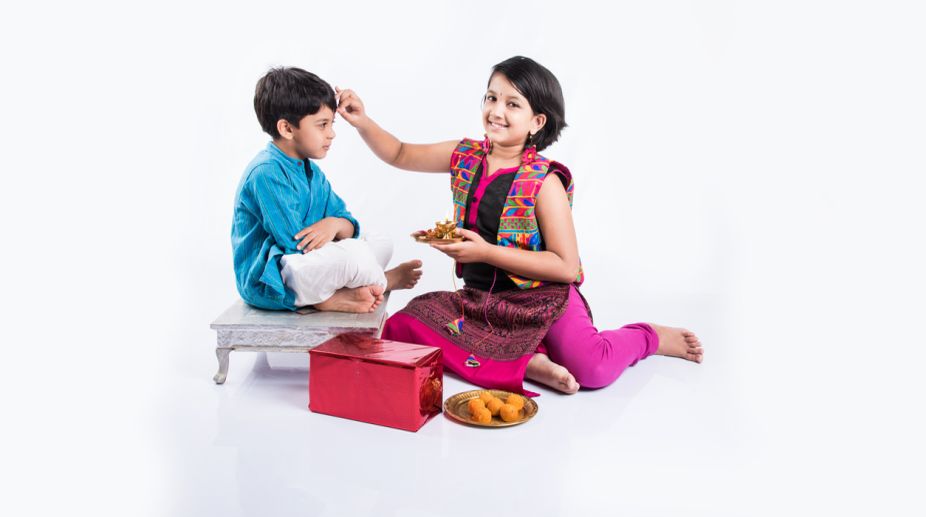Bhai Dooj commonly known as Bhai Phonta in West Bengal is a widely celebrated occasion on the second lunar day of Shukla Paksha (Bright Fortnight). It is an important part of the Indian festivals. Bhai Dooj is another day besides Rakshavandhan when people all over India celebrate the most adorable relationship between a brother and a sister.
But not all of us are aware of the mythical piece which lies behind as a reason for the celebration of Bhai Dooj. Lord Surya, the Sun God was married to a beautiful princess Samjna or Sanghya. The couple gave birth to two beautiful twins and named them Varni or Yamuna and Yama. The brother and sister shared a precious bond. As years passed, the brilliance of her husband became unbearable to Sanghya and thus she decided to go back to Earth.
Advertisement
She left her shadow Chaya, her exact replica, behind, to replace her. Chaya somehow turned out to be a very cruel stepmother. She soon took away everything which Sanghya was owned. She gave birth to her own children and convinced Surya to drive away Varni and Yama from Heaven. Varni was transformed into river Yamuna on Earth and Yama became the King of Underground world (hell). They were happy but the pain of separation affected them. One day Yama decided to visit his sister who was married to a rich and handsome prince. She was rejoiced at her brother’s coming and arranged for a grand feast in his honour after two days of Deepavali.
After aeons, the siblings sat across one another and enjoyed the day in each other’s company. While separating over again, Yama offered Varni any gift she makes a wish for. She wished that from then onwards every brother and sister with such a sweet relationship as theirs should reserve a day in the year to celebrate their love.
Hence, the celebration of Bhai fonta or Bhai Dooj came into practice. The love between a brother and a sister is most beautiful and the purest form of affection.
They have their own fights but at the same time are always prepared to challenge the world for each other. They might not visit each other for years but the protectiveness and love they possess lingers till their last breath. So, wherever we are, let us take out some time from our busy schedule and make this day even more special.
(Anuska Pal, Coordinator, Class X, Gokhale Memorial Girls School)
Festival of unity
The festival of Bhatriditwa,which celebrates the unity of brothers and sisters and their emotional attachment, finds its abode in numerous cultures and traditions which crosses borders to Nepal to re-establish this emotional unity through various rituals. A tilak or tikka or phota on the brother’s forehead with a plate of sweets in front on them signifies reliance for some, emotional attachment for some, security for some while a celebration of traditionality for others. Here are some colloquial names, which in disguise present the same emotion:
Bhai Dooj-
This name is widely used in various parts of northern India like Uttar Pradesh and Bihar where the New Year starts from the lunar month of ‘Kartika’ (October-November). This day signifies the second day of the New Year preceded by Govardhan Puja. Here, the mythological connection is drawn from the grand welcome given by Subhadhra to her brother Lord Krishna on his return after slaying the demon Narkasur. The ‘tilak’ she gave on Krishna’s forehead signifies as an emblem of affection and security for the brother.
Bhaitika-
This festival widely celebrated in Nepal after the occasion of Dashain or Dussehra is the time when a sister pray to Yamraj , the God of Death for the long life of their brother and apply a seven-coloured long tika on their brother’s forehead, signifying their love and affection. It is one of the most important festivals there, which is marked by a public holiday. The Newari, Tharu, Bahun and Chhetri tribal people mainly celebrate this occasion with great zest and vigour.
Bhaiphonta-
This name is quite popular in Bengal where it is celebrated one or two days after Kali Puja. It has its mythological connection to the event of Yamuna of giving a tilak on his brother Yamraj’s forehead, when he was faced with a threat to his life, as is depicted in the verse. Sisters chant a prayer while applying the phonta on their brothers’ forehead. Special sweets like ‘khaaja’ and many others flood the sweet shops of Bengal during this time, which along with paan -supari , dhaan , durbah is used to pray for the long life of the brother. A transaction of gifts forms an integral part of this festival for the sweet-sour relation of brother and sister.
Bhai Bij/ Bhau Beej / Bhav bij –
Mainly celebrated among Marathi, Gujarati and Konkani speaking regions, this festival is customary for every women to celebrate this festival. For sisters who don’t have brothers, embrace the moon or ‘chandrama’ as their brothers, a custom mainly followed in Haryana and Maharashtra. Sweets like basundi puri and kheerni poori add a different charm to these festivals of love and affection.
Yamadwitheya –
This festival is mostly celebrated in South India, which signifies the meeting of God of death, Yama and his sister Goddess Yamuna on the second day after new moon and thus people here celebrate this day as the day of legendary relations of brother and sisters.
(Sayan Chandra, Coordinator, Class XII, St Thomas Boys School, Kidderpore)
All about fun!
It’s eight in the morning. “Wake up Little Susie, wake up…” Jhinook’s phone beeped. Turning off the alarm, she stretched and yawned. The sun peeped through the windows with a smile – the sky promised a lovely Bhaiphonta! Mouth-watering aroma came from inside the kitchen were Jhinook’s mother was finishing off with the delicacies – fried rice, chili chicken, and other delectable treats. Jhinook quickly took a shower, got dressed in her gold and magenta anarkali, put on long earrings and did her hair beautifully.
She looked at herself in the mirror and smiled. She looked perfect. Downstairs, guests were arriving. Soon the house filled up with gossiping aunts and uncles, and naughty brothers and sisters. “So Jhinook, you have not forgotten to buy the Ferrero Rocher, I hope?” the King of Mischief, Deep asked with a mischievous grin.
“And what about my Cavendish and Harvey?” asked his twin, Neel, with an equally playful smile. Jhinook could smell a conspiracy brewing. “You’ll come to know when you get your gifts.” She replied refusing to let go of any details. At that very moment her mother came over and hearing her rude reply, assured the twins that their demands were all wrapped and ready in Jhinook’s room. The damage was done.
The location of the treasure had been handed over to the pirates. She rushed to her room and hid the gifts in her closet behind a stack of books and old clothes. After coming downstairs, Jhinook got engaged in arranging the dhan, dubya and sandalwood paste for the ceremony to begin. When all was ready at last, Jhinook looked around. She could not spot the impish faces of Deep and Neel. Fearing the worst, Jhinook ran to her room. There on the floor lay her books and clothes, and torn pieces of wrapping paper; and with molten chocolate dripping from their mouths like blood from a vampire, stood the culprits.
After 20 minutes, Jhinook sat at one end of the room, fuming, and refusing to give the twins their phontas because they had ruined her gifts. Nothing would calm her down. At another end of the room sat the two who refused to say sorry.
They had taken what was meant for them. They could not understand that they had ruined the whole purpose of giving a surprise. However, in the end, the two realised their mistake. The wrongdoers begged for mercy. Jhinook’s heart melted at the sight of their large innocent eyes. Deep and Neel were forgiven.
With the blow of the conch shell, Jhinook put a phonta on her mischievous cousins’ foreheads, wishing them a life, free from difficulties, and with a mischievous grin a week free from chocolates.
(Renesa Mukhopadhyay, Coordinator, Class VIII, Patha Bhavan, Kolkata)











